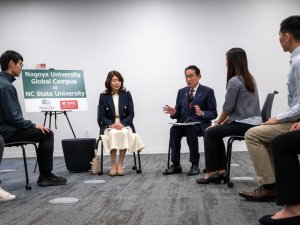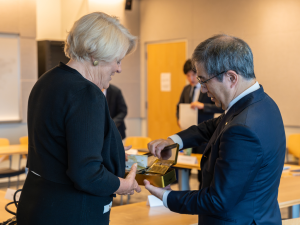Japanese Prime Minister Fumio Kishida shakes hands with Nagoya University President Naoshi Sugiyama, during his recent visit to North Carolina. (Photo by Marc Hall.)
Prime minister’s visit underscores North Carolina’s importance to Japan
This article was originally published on April 15th, 2024 by Joshua K. Jennings of UNC Global Affairs and can be read here.
On Friday, Apr. 12, Prime Minister Fumio Kishida of Japan visited the NC Japan Center and the Nagoya University Global Campus at North Carolina State University (NCSU). Nagoya invited students from UNC-Chapel Hill, NCSU and Duke University to participate in a discussion on the students’ experiences at North Carolina universities.
“It was my greatest honor to meet the prime minister,” Masashi Sode said. Sode is a biomedical engineering doctoral student at UNC-Chapel Hill and was one of two students from Carolina to meet Kishida. He added, “I knew biomedical engineering at Carolina was collaborative, but it is more than I expected. I can discuss research — not as a student to a professor, but as a human to a human — with my biomedical engineering professors, but also computer science professors and medical professors. I really love this open environment, and that’s what I told the prime minister.”
Kishida asked the students about the struggles they have faced and the lessons they have learned living in North Carolina. Kana Adachi, an exchange student from Keio University, studying journalism and psychology at Carolina, said, “I have learned speaking actively in discussion and having an individual opinion are very important in an American university.”
Carolina. Kana Adachi, an exchange student from Keio University, studying journalism and psychology at Carolina, said, “I have learned speaking actively in discussion and having an individual opinion are very important in an American university.”
In December 2023, Carolina’s Vice Provost for Global Affairs and Chief Global Officer Barbara Stephenson met Rahm Emanuel, the U.S. ambassador to Japan, in Tokyo. During their meeting, they discussed the relationship between Japan and UNC-Chapel Hill, including the possibility of the prime minister visiting North Carolina after an official state visit to Washington, D.C.
“It made sense for Prime Minister Kishida to come to North Carolina,” Stephenson said. “Japan and North Carolina are economically intertwined. We face many of the same challenges — like aging populations, the need to prepare for pandemics, the green energy transition and coastal vulnerabilities — and, as close allies, we also share many of the same values.”
Last year, Japanese companies invested more than $10 billion in capital projects and created 3,396 new jobs in North Carolina. As Japanese industry is expanding its investment in the state, the Japanese government is also focused on strengthening its higher education system. Government agencies in Japan are investing in research and innovation by providing funding for universities to collaborate with partners around the world, like UNC-Chapel Hill.
The UNC delegation’s visit to Japan in December was “a chance to highlight our university’s extraordinary research strengths and position UNC-Chapel Hill as a go-to partner for Japan,” Heather Ward, associate provost for global affairs, said. Ward organized the group’s visit.
“In Tokyo, we met with the government agencies that fund higher education and scientific research to understand what we can do to help Carolina researchers access the growing possibilities,” she said.
Two of those agencies — the Japan Science and Technology Agency (JST) and the Japan Society for the Promotion of Science (JSPS) — sent representatives from their Washington, D.C., offices to Carolina in January, along with the science counselor from the Embassy of Japan in Washington.
“Timing is everything,” Krista Northup, Carolina’s director of global partnerships, said. “UNC-Chapel Hill has had partnerships with Japanese universities for years, and now the Japanese government is revitalizing research collaboration and investing significantly in it. With the UNC-Chapel Hill delegation’s meetings there in December, we have made clear to Japan that Carolina is eager to collaborate.”
Since the delegation’s visit to Japan, there has been a rapid sequence of follow-up conversations and strategic meetings — in Chapel Hill, Japan, Washington, D.C. and online — to strengthen ties between Carolina and Japanese universities.
Kazuyoshi Shimada and Yuko Tsuda (JST), Junji Urakawa and Yuki Komatsuzaki (JSPS) and Koji Aribayashi (Japanese Embassy in Washington, D.C.) met with several Carolina leaders, including Stephenson and Vice Chancellor for Research Penny Gordon-Larsen, during a visit to campus in January. According to Northup, this was an opportunity to discuss shared challenges, Carolina’s standout strengths and the Japanese government’s desire to develop young research talent.
“These agencies are committed to funding joint research and faculty mobility that are mutually beneficial,” she said. “Fortunately, Carolina faculty are interested in working closely with researchers in Japan and many already do.”
One example is Koji Sode, professor of biomedical engineering, who traveled in December as part of the UNC-Chapel Hill delegation. In January, the representatives from JST, JSPS and the embassy toured K. Sode’s biosensor lab and other research facilities, like READDI, which seeks to develop new antiviral medications before the next pandemic. K. Sode collaborates with researchers at the Tokyo University of Agriculture and Technology and sends U.S. and Japanese graduate students back and forth between the two universities. During the tour, K. Sode’s students showcased their research and emphasized the ways the exchange benefitted their work. His lab models how the Japanese government hopes to develop a new generation of researchers and innovators in Japan.
Additionally, during their visit, Shimada and Tsuda (JST) invited UNC-Chapel Hill to co-sponsor the Japan-U.S. Research Collaboration Week this summer with Stanford University, giving Carolina faculty an opportunity to showcase their research.
“It’s really important to have these connections with the Japanese government agencies,” Northup said. “Doing so builds credibility and increases the potential for Carolina faculty to engage with Japanese researchers in the future.”
Another outcome from the D.C. representatives’ visit was a webinar on research funding opportunities with Japan. Individuals from JST, JSPS and the Japan Agency for Medical Research and Development (AMED) presented to more than 50 Carolina faculty. Northup and Nathan Blouin, UNC-Chapel Hill’s director of the Office of Research Development (ORD), co-hosted the webinar.
“At UNC Research, we expand Carolina’s capacity for innovative, groundbreaking research,” Blouin said. “One way we enhance faculty research is by guiding and supporting grant funding opportunities, such as these recent developments in Japan.”
In reference to Blouin’s comments, Northup added, “Our work in the OVPGA is complementary to ORD’s. We spot high-potential, low-risk opportunities and find collaborators to realize the engagement that will move discovery forward.”
 A few weeks after the UNC-Chapel Hill delegation’s visit to Japan — which included the first official visit from Carolina to Nagoya — Carolina welcomed a reciprocal delegation from Nagoya to explore research connections in medicine.
A few weeks after the UNC-Chapel Hill delegation’s visit to Japan — which included the first official visit from Carolina to Nagoya — Carolina welcomed a reciprocal delegation from Nagoya to explore research connections in medicine.
Nagoya’s Vice Dean for International Affairs in the Graduate School of Medicine and the School of Medicine Hideki Kasuya and three colleagues shared their research interests with UNC-Chapel Hill faculty in medicine, nursing and public health. While on campus, Kasuya signed an agreement with UNC-Chapel Hill, expanding the long-standing visiting scholar program for Nagoya and Carolina students in medicine to participate in an exchange program.
Following Nagoya’s visit, Carolina’s Associate Professor of Geriatric Medicine John Batsis was invited to Nagoya at the end of February. He gave lectures, toured facilities, met with researchers, visited classrooms and advanced opportunities for researchers at the two universities to work together on aging research.
A couple weeks after Batsis traveled to Japan, Nagoya’s Hiroyuki Umegaki, professor in the Department of Community Health and Geriatrics, visited Carolina to further pursue research collaboration in aging with faculty in Carolina’s division of geriatric medicine.
“Partnerships tend to be organic. They need people and purpose to drive progress. With Nagoya, we have several research faculty who see the benefit of working together, contributing to the overall university-wide partnership,” Northup said.
At the same time, successful partnerships benefit from institutional commitment, coordination, and support. In 2022, Nagoya’s vice president for international affairs traveled to Carolina, and in 2023, Nagoya’s president, Naoshi Sugiyama, visited. The December trip marked the first official delegation from UNC-Chapel Hill to Nagoya University. Sugiyama returned to North Carolina during Kishida’s visit to meet with Carolina’s provost Christopher Clemens, a fellow astronomer, on April 11. Later this year, Carolina and Nagoya will host a second exchange program focused on women’s education and careers in cybersecurity, following the success of the 2023 exchange and with renewed support from the U.S. Embassy in Tokyo.
According to Ward, this series of visits is fueling new collaboration; it is creating momentum, an agenda and the outcomes that will result in new discovery and learning.
“Developing stronger relationships with Japan is a strategic priority,” Ward said. “UNC has a track record of being a committed, long-term partner. Now, we’re seeing new opportunities for funding, government programs and relationships that align with Carolina’s core mission of teaching, research and service to the state of North Carolina.”



